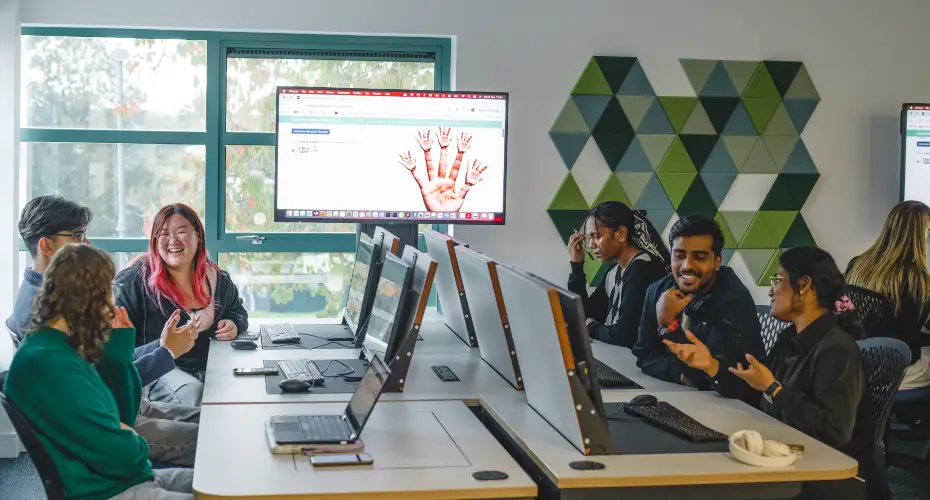| UCAS code | 1234 |
|---|---|
| Duration | 1 year full time 2 years part time |
| Entry year | 2025 |
| Campus | Streatham Campus |
| Discipline | Data Science and Analytics |
| Contact | Web: Enquire online |
| Typical offer | A good degree (normally a 2:2). |
|---|---|
| UCAS code | |
|---|---|
| Duration | 2 years full time |
| Entry year | 2025 |
| Campus | Streatham Campus |
| Discipline | Data Science and Analytics |
| Contact | Web: Enquire online |
| Typical offer | A good degree (normally a 2:2). |
|---|---|
Overview
- This well-established conversion course, with a network of over 600 graduates, will enable you to learn data science skills alongside the fundamental mathematics that underpins all data.
- You will learn to programme in Python and R (no prior experience of programming is required) and explore a wide variety of applications to prepare you for a career working with data in a variety of sectors.
- Benefitting from the skills and experience of our academics in the Mathematics and Statistics department, you will work extensively with data and gain the ability to perform statistical analysis to answer questions, and understand how to interpret and communicate results in the presence of bias and uncertainty.
- You will graduate with the capability to extract otherwise-hidden information within data and use it to make informed ethical decisions, with the skills needed to become a rigorous and responsible data scientist or analyst.
Fast Track (current Exeter students)
Applied Data Science and Statistics MSc at the University of Exeter.
![]()
Top 20 in the UK for Mathematics and Computer Science
18th for Mathematics and 19th for Computer Science in the Complete University Guide 2025
![]()
Long-established partnership with the Alan Turing Institute and home to the Institute of Data Science and Artificial Intelligence
![]()
Excellent facilities spanning a wide range of machine types and software ecosystems alongside world-class computer science labs
![]()
Top 20 in the UK for Mathematics and Computer Science
18th for Mathematics and 19th for Computer Science in the Complete University Guide 2025
![]()
Long-established partnership with the Alan Turing Institute and home to the Institute of Data Science and Artificial Intelligence
![]()
Excellent facilities spanning a wide range of machine types and software ecosystems alongside world-class computer science labs
Entry requirements
A good degree (normally a 2:2).
Successful applicants will usually have at least an A-level or equivalent in Mathematics and/or have received quantitative skills training as part of their undergraduate programme or professional experience.
Prior experience of coding is not necessary on this course.
Please also see our guidance on essential documentation required for an initial decision on taught programme applications.
Entry requirements for international students
English language requirements
International students need to show they have the required level of English language to study this course. The required test scores for this course fall under Profile B3. Please visit our English language requirements page to view the required test scores and equivalencies from your country.
"The course was an extensive coverage of data science and stats, with lots theoretical and practical learning. All the lecturers I had were fantastic. They were always very willing to help, super approachable and really friendly. It was so nice to be able to feel like I had a proper relationship with them.
My dissertation supervisors were the best supervisors I could’ve asked for. They’d help whenever and always provided brilliant guidance allowing me to do my best.
Now I’ve graduated I’m working at Mazars as a Data Analyst. It’s been really nice to use the things I learnt during my masters in my career, and I’ve felt unbelievably well prepared going into my professional life."
Matt
MSc Applied Data Science and Statistics graduate
Course content
The programme will include applications across a wide variety of sectors and help you develop innovative and responsible approaches to the use of data. You will cover the entire spectrum from collection through to interrogation and analysis, interpretation, visualisation, and communication.
Our data governance and ethics module is essential to this programme – you will learn from colleagues in our faculty of Humanities, Arts and Social Sciences how the complex technologies behind data science can be managed and governed for the benefit of society now and in the future, as well as exploring your responsibility as a data scientist for ensuring that data and the technologies used to harvest and analyse it are used ethically.
Assessments will be based on a combination of exams, group and individual project work, practical data analysis, visualisation and communication skills.
You do not need any prior experience of coding to study this programme. Our Working with Data (MTHM501) and Applications of Data Science and Statistics (MTHM503) give you a great introduction to programming in in R and Python.
The course is based around open source software (Python and R) meaning that you will be well-equipped to apply your new skills to any setting when you graduate. As a student you will also have access to other programmes, such as Matlab, through the University.
All aspects of the course are designed with windows, mac and linux in mind.
The taught component of the programme is completed in June and you will complete your Applied Data Science and Statistics project (dissertation) over the summer period for submission in September. You can submit your own project idea or take up an idea proposed by an external organisation, supervisors from the Applied Data Science and Statistics teaching team or from colleagues across the University such as from our Centre for Computational Social Science (C2S2) The dissertation is an extensive project of approximately 15,000 words that involves project planning, analytical, experimental or empirical results and their interpretation, showing how the goals of the project have been met.
The modules we outline here provide examples of what you can expect to learn on this degree course based on recent academic teaching. The precise modules available to you in future years may vary depending on staff availability and research interests, new topics of study, timetabling and student demand.
Compulsory modules
| Code | Module | Credits |
|---|---|---|
| MTHM501 | Working with Data | 15 |
| MTHM502 | Introduction to Data Science and Statistical Modelling | 15 |
| MTHM503 | Applications of Data Science and Statistics | 15 |
| MTHM507 | Communicating Data Science | 15 |
| MTHM017 | Advanced Topics in Statistics | 15 |
| MTHM506 | Statistical Data Modelling | 15 |
| MTHM505 | Data Science and Statistical Modelling in Space and Time | 15 |
| SOCM033 | Data Governance and Ethics | 15 |
| MTHM504 | Applied Data Science and Statistics Project | 60 |
If you have chosen to study Applied Data Science and Statistics with Professional Placement, your course will be structured as follows:
Year 1 – study all the 15 credit taught modules in the module table above and secure a work placement for year two.
Year 2 – take part in a work placement and complete your Applied Data Science project (dissertation).
During your work placement you will gain extensive practical work experience, giving you the chance to apply the knowledge and skills you have acquired from taught modules to authentic problem solving in a professional environment. Collaborating with your work placement employer, you will identify a project that will constitute your MSc dissertation. Ideally, the dissertation should be based on the work that you will undertake during the placement, but this is not compulsory. The dissertation is an extensive project of approximately 15,000 words that involves project planning, analytical, experimental or empirical results and their interpretation, showing how the goals of the project have been met.
Course variants
- Combine your masters in Applied Data Science and Statistics with work experience in the UK, putting your learning into practice while studying
- Studied over two years, you’ll have the opportunity to gain valuable professional experience by completing a 9-12month work placement in a role relevant to your degree
- Become a sought-after professional with strong industry experience
Fees
2025/26 entry
UK fees per year:
£14,300 full-time
With Professional placement (second year) £2,860 full-time
International fees per year:
£30,300 full-time
With Professional placement (second year) £6,060 full-time
Scholarships
The University of Exeter has many different scholarships available to support your education, including £5 million in scholarships for international students applying to study with us in the 2025/26 academic year, such as our Exeter Excellence Scholarships*.
For more information on scholarships and other financial support, please visit our scholarships and bursaries page.
*Terms and conditions apply. See online for details.
Teaching and research
Teaching on this programme is delivered through a mix of lectures, projects, group work and hands-on lab sessions. Many of your lectures will be interactive combining a blend of classroom learning, coding and data analysis. Group and individual projects will be undertaken using real data and will often focus on topical challenges which are the focus of current research.
Assessments
The assessment strategy for each module is explicitly stated in the full module descriptions given to students. Group and team skills are addressed within modules dealing with specialist and advanced skills. Assessment methods include essays, closed book tests, exercises in problem solving, use of the Web for tool-based analysis and investigation, mini-projects, extended essays on specialised topics, and individual and group presentations.
Artificial Intelligence at Exeter
The University has invested £50 million in the development of its Data Science and Artificial Intelligence capabilities. The Accelerating Data Science and Artificial Intelligence (ADA) project has been running since 2023 and has invested in teaching, research and infrastructure which this programme benefits from.
Teaching on this degree is directly influenced by research undertaken within Exeter’s Institute for Data Science and Artificial Intelligence which provides a hub for data-intensive science and artificial intelligence activity within the University.
The institute’s vision for data science is to find new means of interrogating and understanding data and to apply cutting-edge data analytical methodologies to diverse questions. It is a truly interdisciplinary research community made up of data scientists, mathematicians, and computer specialists across many of Exeter’s research groups and departments.
Internationally recognised research
We believe every student benefits from being taught by experts active in research and practice. All our academic staff are active in internationally-recognised scientific research across a wide range of topics. You will discuss the very latest ideas, research discoveries and new technologies, becoming actively involved in a research project yourself.
Academic partners
Our long-established partnership with the Alan Turing Institute, the UK’s national institute for data science and artificial intelligence, means that we have strong connections to the UK AI research community. Currently we host 11 Turing Fellows and one Turing AI Fellow at the University. Turing Fellows are established scholars with proven research excellence in data science, AI, or a related field. Lectures, conferences and seminars organised by Turing and the Turing University Network are usually open to our students to attend either in person or online.
Supportive environment
We aim to provide a supportive environment where students and staff work together in an informal and friendly atmosphere. We operate an open door policy, so it is easy to consult individual members of staff or to fix appointments with them via email. As a friendly group of staff, you will get to know us well during your time here.
Facilities
World-class facilities
Our latest computing facilities are world-class spacious teaching labs allowing comfortable, collaborative working in a sensory-friendly environment.








Careers

Employer demand for statistically-trained data scientists is high.
A World Economic Forum report ‘The Future of Jobs 2023’ projects that the demand for data analysts and scientists, big data specialists, business intelligence analysts, database and network professionals and data engineers is growing by 30 to 35%.
Graduate destinations
Whether you’re looking to take your career in a new direction or for an MSc that will sit alongside your undergraduate degree to land you an exhilarating graduate job, you’re unlikely to find a better choice than Applied Data Science and Statistics. Previous graduates from this programme have gone on to work for a variety of organisations from small start ups through to large multinational corporations in locations across the world.
Dedicated careers support
You will receive support from our dedicated Career Zone team, who provide excellent career guidance at all stages of career planning. The Career Zone provides one-on-one support and is home to a wealth of business and industry contacts. Additionally, they host useful training events, workshops and lectures which are designed to further support you in developing your enterprise acumen. Please visit the Career Zone for additional information on their services.











